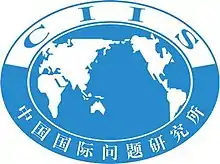China Institute of International Studies
CIIS, or the China Institute of International Studies (Chinese: 中国国际问题研究所; pinyin: Zhōngguó Guójì Wèntí Yánjiūsuǒ) is a professional research institute directly administered by the Ministry of Foreign Affairs of the People's Republic of China.[3][1][4] The Institute primarily focuses on issues associated with global politics and economics. It also facilitates the decision making process of the central government.[5]
 | |
| Formation | 1956 |
|---|---|
| Type | Think tank, institute |
| Purpose | Foreign policies, global affairs, geopolitics |
| Location | |
President | List of CIIS Presidents
|
| Affiliations | Ministry of Foreign Affairs of the People's Republic of China |
Staff | c. 100[1] |
| Website | www |
Formerly called | Institute of International Relations of the Chinese Academy of Sciences (1956-1958) Institute of International Relations (1958-1986) |
The institute was founded in 1956 as the Institute of International Relations of the Chinese Academy of Sciences. It was renamed Institute of International Relations in 1958, and assumed its present name in December 1986. In 1998, the China Center for International Affairs, formerly a research institution of China's State Council, was incorporated with CIIS.[1]
Organization
The Institute researchers are mainly composed of senior diplomats and prominent scholars. There are also young graduates of IR backgrounds from advanced universities.[2] The presidency is held by former Chinese Ambassadors; the incumbent president is Su Ge.[1]
The organization comprises eight departments and four affiliate bodies:
- Departments[1]
- Department of Global Strategy
- Department of Information and Contingencies Analysis
- Department of American Studies
- Department of Asia-Pacific Security and Cooperation
- Department of EU Studies
- Department of Developing Countries Studies
- Department of Shanghai Cooperation Organisation Studies
- Department of World Economy and Development Studies
- Affiliates[5]
- China National Commission for Pacific Economic Cooperation
- China Commission of the Council for Security Cooperation in the Asia Pacific
- China International Studies and Academic Exchange Foundation
- China Arms Control and Disarmament Association
It also houses Research Centers on the study of European Union, the Middle East, the South Pacific, China's Energy Strategy, Periphery Security and World Economy and Security.[1] In addition, the Institute runs the International Affairs Office, which is responsible for overseeing international liaisons, and an editorial office for the publication of the Chinese and English version of the bi-monthly journal International Studies, whose contributors include CIIS researchers and independent foreign affairs experts.[5] In July 2020, the Research Center for Xi Jinping Thought on Foreign Affairs opened at CIIS.[6]
Notes
References
- "CIIS in Brief". China Institute of International Studies. Archived from the original on 2013-10-21. Retrieved 2013-11-07.
- "Former Presidents". China Institute of International Studies. Archived from the original on 2013-10-09. Retrieved 2013-11-07.(in Chinese)
- Casarini, Nicola (June 2012). "The Role of Think Tanks in China" (PDF). Europe China Research and Advice Network. Archived (PDF) from the original on 2020-02-29. Retrieved 2020-02-29.
- Civil-Military Change in China Elites, Institutes, and Ideas after the 16th Party Congress. DIANE Publishing. 2004. p. 282. ISBN 978-1-4289-1026-3.
- Qiushi Journal (English ed.). Qiushi Journal Press (3). 2011. ISSN 1674-7569.
{{cite journal}}: Missing or empty|title=(help) - Bandurski, David (21 July 2020). "New Xi Jinping Foreign Affairs Center Opens". China Media Project. Retrieved 26 July 2020.